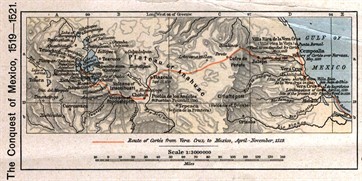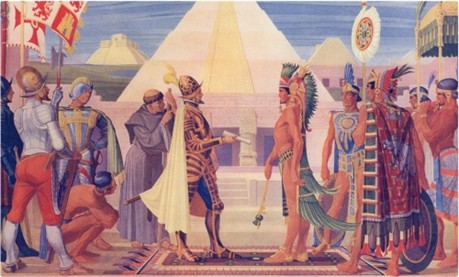Cortez, a maimed boy born into
poverty from Medellin, Spain, was trained in the theocratic
tradition of Spanish scholasticism. In time he would raise
enough money to lead 11 ships and 500 soldiers to Mexico.
When his men saw the Mayan ruins on the Yucatan they were convinced
that they had landed on the sparkling shores of the richest of all
worlds. click here for more

The Mayans who
met them were clever - telling them about the rich Aztec empire to
the north. When the Aztec king, Montezuma, sent an emissary
to meet with Cortez at Veracruz, the Spaniard's curiosity and
imagination were instantly excited by the gold jewelry worn by his
Aztec host.
"We have a
disease of the heart," he told him, "that can only be cured by
gold. Do you have more?"

Hernan Cortez meeting the Aztec king in Tenochtitlan.
This simple
question - and the answer - changed all of history. The
emissary nonchalantly declared that he did. Lots of it.
But Cortez knew that he would have a lot of trouble convincing his
men to make the arduous trek inland, over 15,000 foot peaks, to
reach the Aztec capital. So he burned the ships, and the
gamble worked. The men joined him on the trek.
What Cortez
knew about the Aztecs was very little. A local shaman told
him that the Aztec kingdom was ruled by fear and supernatural
beings. The Aztec king was also haunted by a long honored
prophecy that the Aztec kingdom would come to an end when the great
god Quetzalcoatl, who had been cast out, returned with his blue
eyes and silver hair to reclaim his kingdom. The prophesy
said that Quetzalcoatl would return in the Aztec year, 1 Re, the
first year in a cycle of 52 years built into their calendar.
In a 1-in-52 chance, Cortez arrived in the Aztec year of 1 Re.
(click here for more)
As Cortez and
his men stood on the mountain above the gleaming city of
Tenochtitlan, what they beheld with their own eyes seemed to
fantastic to be real. It was a vision, Cortez later wrote,
"of the most beautiful city in the world, unlike anything we had
ever seen, a city that thrived on an island with great temples and
markets, lawyers and doctors and judges and courts, poets,
courtesans, musicians, jugglers and artists.
Related Events
Related Flashpoints